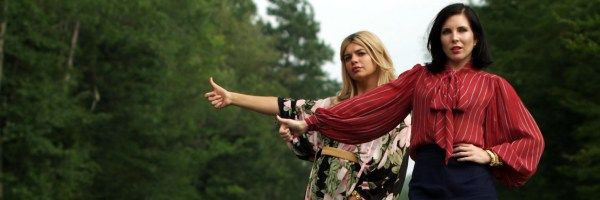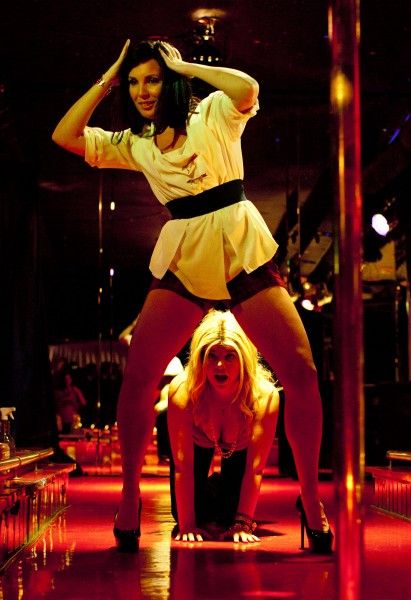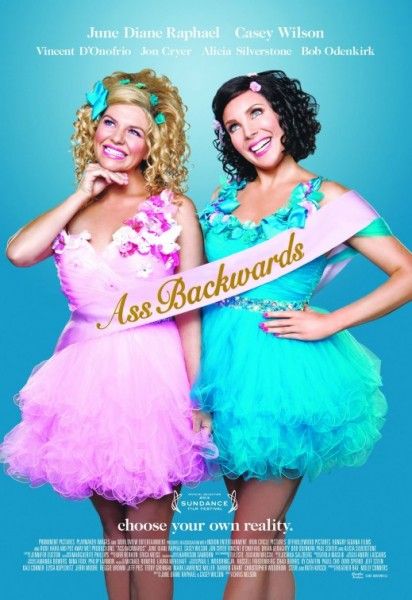In the indie comedy Ass Backwards, Kate (June Diane Raphael) and Chloe (Casey Wilson) are two childhood best friends who met when they placed dead last in their hometown beauty pageant. Even though they are now all grown up and living in New York City, when they receive an invitation to return to their hometown pageant, they decide to take a roadtrip that quickly becomes a zany journey to reclaim the crown.
During this recent exclusive interview with Collider, co-writers/co-stars Casey Wilson and June Diane Raphael talked about how the idea for this film came about, what brought the road trip aspect together with the beauty pageant aspect, how they knew they made a good writing team, how they view Kate and Chloe’s friendship, finding the right director to hand their script over to, and how they’re currently writing two TV pilots, one for ABC called DINKS (that Raphael also plans to act in) and one at NBC called The Mason Twins. Wilson also talked about her experience working on the David Fincher film Gone Girl, while Raphael talked about how doing a small role in Anchorman 2 was one of the best experiences of her life. Check out what they had to say after the jump.
Collider: How did this film come about? Did you have a specific idea that you wanted to explore?
CASEY WILSON: It’s based on June and I’s friendship. Obviously, the character are way heightened beyond us. We met at NYU, and the movie is based on a specific time in our lives when we graduated and were living in the East Village and sharing credit cards. Our lives were in shambles, but we thought everything couldn’t be going better. Instead of taking a hard look at what we didn’t have, we would just build each other up, in all the wrong ways, and make each other feel good about our lives. That kind of co-dependent female friendship, we just find really funny. It happens, after college and before you’re married. You have a death pact with one another. That’s how the movie came about.
Was there something that brought the road trip aspect of the story together with the beauty pageant aspect?
WILSON: Specifically, we took a road trip together and our friendship basically fell apart. There’s something about heading out on the road together where you’re trapped in the car, and you come to hate each other. June was in charge of planning the trip, and I was in charge of the music. We were supposed to drive from New York to North Carolina and she took us in to states that not only don’t border North Carolina, but her geography was all off. She had us on a flight, at one point, but we didn’t land in North Carolina. It made no sense. So, that was a problem. And then, I brought all my CDs for music. It ended up being a 30-hour trip, and all of my CDs skipped because I take such poor care of things. In the movie, we end up singing along to the skips, and that came from real life.
And then, how did the beauty pageant idea come up?
WILSON: We had a couple different versions of the movie and a couple different ideas about where we wanted Kate and Chloe to go. Something that became important to us was that we didn’t want the prize of the movie to be a man, at the end of it, or a wedding. We wanted it to be something where they had lost something, as younger kids, and could justify their co-dependence as adults. We just loved the idea of them having lost when they were little, and not letting each other feel that loss. That was always the drive. And we were batting around a few ideas and, admittedly, we do have a love for Toddlers & Tiaras. There’s something so grotesque and wrong about it. You can’t take your eyes off of it. So, that became this thing. We also loved the idea of beauty pageants because it was the thing they were going back to try to win. We love that, at the end, it’s a terrible thing to even want. It’s a prize that’s not a prize, at all. We really responded to that. But, we’re not pageant kids. We didn’t do the pageant circuit. It’s just based on the old imagination.
The movie starts off very memorably with the shot of your bare asses. With a movie like this and characters like these, was it important to start off with a bang, so that people knew exactly what kind of movie they’d be seeing?
WILSON: We start off all of our work with that image, so you’ll know that image very well.
JUNE DIANE RAPHAEL: I do think it sets the tone to get your mind right and know this is going to be something different. We love that it starts with something that is outrageous. I think people know that this isn’t one of those Sundance comedies where it veers more to a drama than a comedy, and there’s witty dialogue. This is like, “Okay, we’re going for something bigger here.” It definitely sets the tone.
When and how did you guys know that your personalities clicked enough that you could work together effectively and successfully without wanting to kill each other?
WILSON: When we got out of NYU, a girlfriend of ours asked us to put up a sketch for fun at this little comedy night in the East Village. We did it for the fun, and we just had such a fun time that I was like, “Oh, this is so fun!” It was easy. I remember that the idea came easily, and the working on it came very easily. From there, we just kept working together. So, I don’t know if there was one moment, but I remember being like, “Oh, this is really fun.” We’d been getting together to do more “serious” things, so it was the first time I tried to step into comedy, in that way.
RAPHAEL: I think it’s a good sign that there wasn’t much thought about it. We both see a lot of people in L.A., and friends of ours, who are like, “I’m searching for a writing partner.” Sometimes it’s hard to have a chemistry and a connection, in that way. For us, it did start off as a hobby, and as something we wanted to do because we had a blast doing it. That was the only reason why we were doing it. And then, once we realized it could be something, and we got a really great response from some of the stuff we put out, we just wanted to do more. The good thing about me and Casey was that we were always thinking bigger and better. We always wanted to play in bigger sand boxes. We’ve both always had that drive.
WILSON: Yeah, we’re gonna run for co-President.
RAPHAEL: Maybe that was to our detriment, at certain points, but any idea the other one had was always supported, pretty much 100%. So, it was a very natural process with very little decision making and very little thought.
Do you typically write together, or do you pass things back and forth?
WILSON: Oh, it’s so complex that it’s a secret. No. We usually break the story together, in the same room. And then, we’ll just talk about it, for a long time. Once we have figured it out, we will go our separate ways. We don’t sit in the same room with each other, listening to each other type.
RAPHAEL: Also, we’re both acting a lot, so we don’t really have time to do it that way. It seems to work to just pass it back and forth. We take passes on each other’s stuff, and just keep it moving.
When you look at these two women from the outside, you might think they’re a bit aimless, but they’re clearly friends who have spent their lives building each other up when no one else would. How do you see their friendship? Do you see them as co-dependent, or are they just really lucky to have each other?
RAPHAEL: I think it’s both. They’re definitely unhealthily co-dependent. But, we try to take the audience on a journey where, in the end, they really do have each other. I think that’s at the heart of all female friendships that are that close. Obviously, the comedy comes from how co-dependent they are. But at the end of the day, they really do have each other, and that’s the love story of the movie.
WILSON: We always wanted them to learn a little bit, but part of the reason why we love them so much is because they can live in this fantasy world with each other, and they have this enthusiasm and spirit and sincerity. In this day and age of sarcasm, and every movie is ironic, and everybody is over it, we really love that they’re not that way. They sincerely believe in the other person. It’s only when they’re forced, on this road trip, to really take a close look ‘cause they can’t not, that things start to break down. But, we never wanted to destroy their spirits, altogether, at the end, and make them so different that we take away what we love about them. I do think they are lucky to have each other, as sick and twisted as the friendship is. I think it’s co-dependent, but I also think there’s a lot of genuine love there.
RAPHAEL: That’s what we have in life. Your best friendships are with people who share your world view. As heightened as they are, they get a kick out of each other and they’re on the same page.
How difficult was it to find a director that you could hand this over to, who understand your vision and who these women were, and what made Chris Nelson the right guy for the job?
RAPHAEL: It was actually a difficult process because a lot of the male directors that we first approached felt that the script was too female for them. A lot of the feedback we got was that they felt it needed a female director, which was weird to us. There’s unfortunately not a lot of female directors to choose from, but it was a weird comment because we just felt that it was a comedy. Obviously, it does star two women, but there was nothing about it that demanded a female director. Casey and I have such an easy vocabulary with each other, but we also don’t agree on every single thing. It was just like, “Who is this person that’s going to come in and know how to deal with our collaboration and how strongly we feel about things, and also have his or her own vision for the movie that we agree with?” I really admire that our director was able to do that. It always just felt like he was part of the team. I don’t know if I would want to walk into what Casey and I do.
Casey, you did a role in the David Fincher film Gone Girl, and June, you did a role in Anchorman 2. What were those experiences like?
WILSON: It’s been great. We love working together, and we came to this writing partnership as a way to act in things, both together and separately. I’ll speak for myself, but it’s great. It’s always great to get to do what you love and to do something that hopefully people will see and love. It’s been awesome!
RAPHAEL: Anchorman 2 was one of my favorite experiences, ever. I just loved it, so much. I have a small role in it, but just to be a part of a movie that is the sequel to a movie I care so much about was great. It was just the most joyful, fun, playful set. I was blown away. I loved it so much!
WILSON: The Gone Girl set wasn’t as playful. It was a little more meticulous. There was a lot of blood and gore. So, it was less playful, but really fun.
And you’re writing TV pilots together, as well?
WILSON: I think TV is great, and we’re having fun. It also just moves so much quicker than film. We’ve got two projects, one at ABC (called DINKS) and one at NBC (called The Mason Twins), and we’re really excited.
RAPHAEL: You don’t have to spend eight years of your life trying to get it done. You can get your answers very quickly, and there’s something satisfying about that. Writing pilots is such a specific thing. It’s not even really writing TV shows. A pilot is its own beast. But, I feel like we’ve gotten a real handle on it and it’s enjoyable. So far, we’ve had a great experience.
Are you looking to also act in one of those shows?
RAPHAEL: I’m planning on acting in the one for ABC, if it should all go forward.
Ass Backwards opens in theaters on November 8th.



